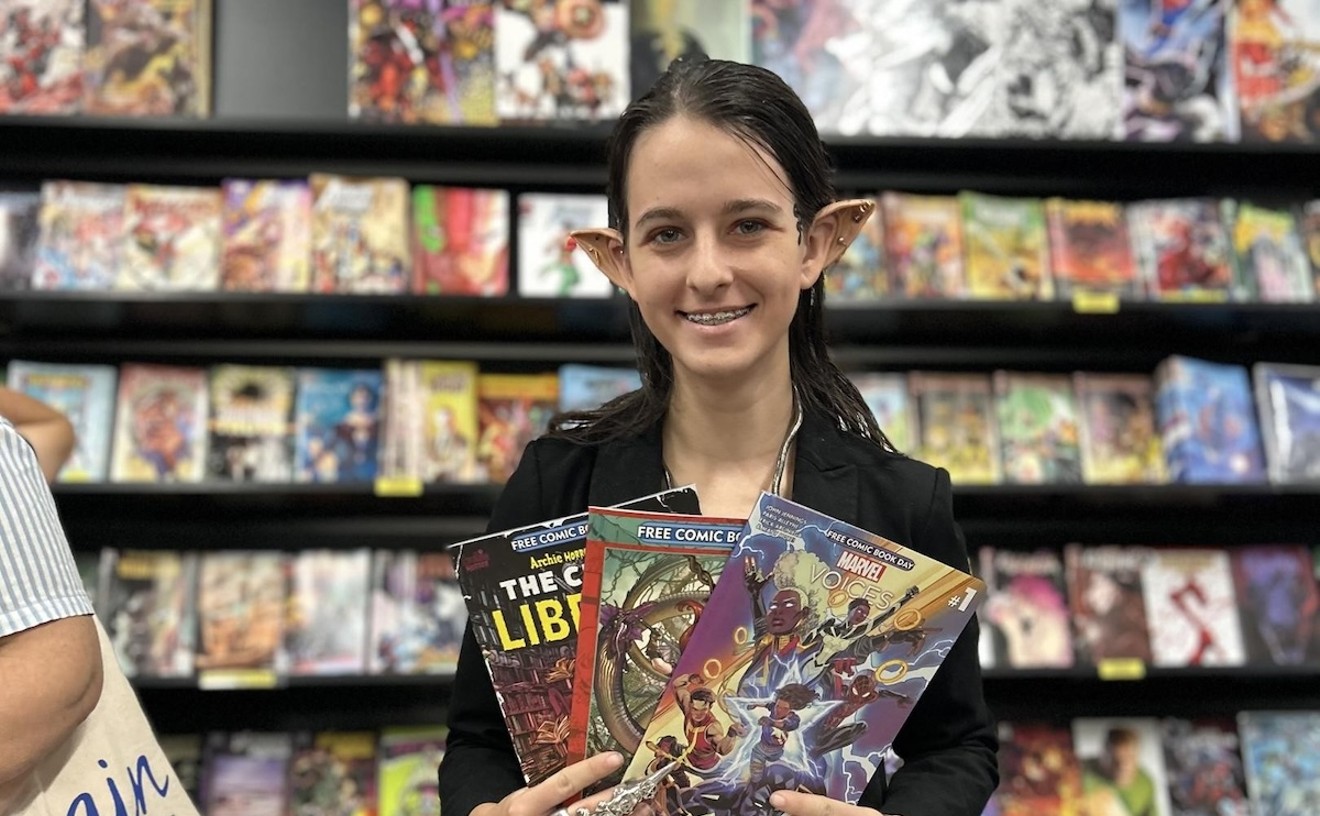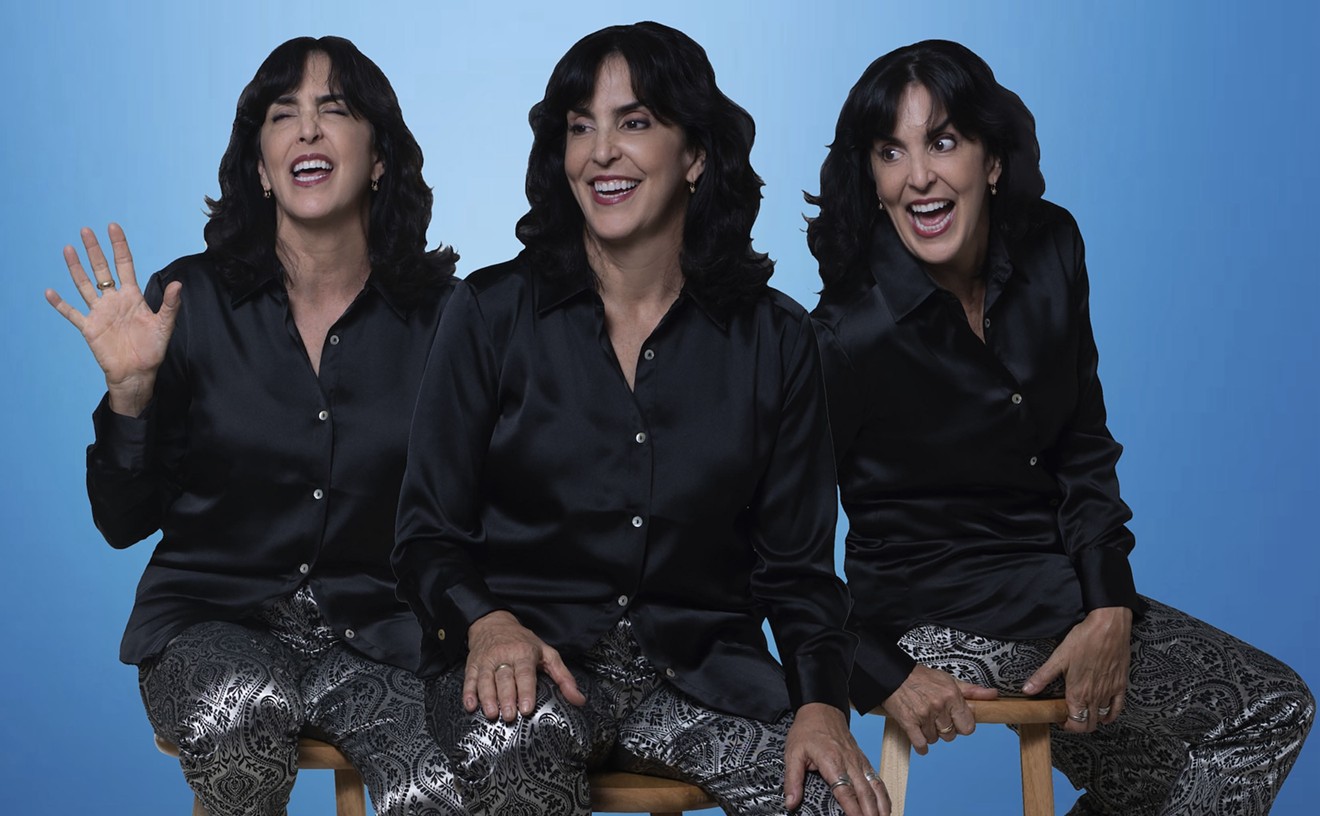The responses the pair received confirmed their perception of Miami as the perfect place to create a piece dealing with the roles that people play, with some of the respondents interpreting the ad as an open call for a production.
"So many people came with their portfolios," laughs Jennifer McDonald now. "They were ready to audition for a part."
Leone & McDonald sent the would-be actors on their way, choosing instead 30 people who were willing to talk openly about their lives on camera. Passing, the artists' half-hour video now showing in the Centre Gallery at Miami-Dade Community College's Wolfson Campus, was culled from hours of those confessional interviews. On a large screen in the darkened gallery, the various subjects -- who appear as talking heads -- tell their secret stories, unmasking the private selves beneath what are often carefully cultivated public personas. In doing so they talk about how their characteristics -- skin color, hair, clothes, or accent -- define how they are perceived and treated by others.
The expression "passing" has traditionally been used to refer to light-skinned blacks who are able to pass as white and thus gain access to opportunities historically denied them. Blond, blue-eyed Jews pass as gentiles, and gay men and lesbians have adopted the word to describe passing for heterosexual in the workplace or in certain social settings. When MDCC galleries director Amy Cappellazzo commissioned Leone & McDonald to create a site-specific installation, the artists decided to explore the notion of passing in further detail.
"We were interested in broadening the term specifically as it relates to Miami," explains Hillary Leone, who grew up here but moved away in 1979 to attend Brown University in Providence, where she met McDonald. (The artists were in town for the opening of the show on February 8.) "Why do people pass?" Leone continues. "For personal advancement, for survival, or solely for the pleasure of masquerade?"
Through the stories of the people featured in the video, Leone & McDonald explore each of these reasons, presenting a deeper examination of Miami's population than its stereotypical "multicultural" definition allows. The participants, many of them MDCC students, paint a picture of diversity that flies in the face of the usual labels used to categorize the city's residents: Latin, Haitian, Anglo, black, gay, and straight.
For many of the interviewees, passing means coming up with what is considered an acceptable answer to the frequently asked question, "What are you?" One young woman of Asian, African, and European descent relates the dismay she experienced when she discovered that her only option was to check the "other" box to describe her race on a school registration form. And a man with olive skin relates people's unwillingness to believe that he's black. "I can't be black and surf because black people 'don't do that,'" he scoffs. "I swim every chance I get. Again, a very un-Negrolike characteristic according to them."
While comments such as that one merely underscore common racial stereotypes, others are more specific to Miami. A college-age white man tells how he has learned to use the aggressive mannerisms he attributes to Latin macho culture to get served quickly in a restaurant: He yells a few Spanish words across the room to a waitress, and refuses to make eye contact with anyone. "I truly believe that we are basically who we associate with," he muses, "and I wonder if I'm turning Latin." This kind of role reversal could occur only in a city in which Latins have become a majority. Similarly, a blond, blue-eyed woman relates the trauma of growing up here: Being teased by other children because of her all-American looks.
In Miami, language's ability to prescribe social roles is undeniable. But instead of confining themselves to the obvious split inherent in individuals who identify themselves as Cuban American, Leone & McDonald have searched for more unusual takes on the innate power of language. One woman with a Spanish accent describes how she told her lover she was French and faked a French accent throughout their extended relationship, while a young man named Stewart hilariously relates how he pretended he was Scottish to stand out in high school -- until a real Scot joined his class.
The video jumps from issues of race and language to those of gender and sexuality. For example, a drag queen who is not in drag describes the advantages of passing as a woman: "As a man I didn't have much power. Until I dressed as a woman." A lesbian describes how her womanly body makes professional colleagues more open to her than they would be if she fit their image of a homosexual: "Most of the time I'm comfortable being able to pass as a heterosexual because the access it allows is just unbeatable." And a preppy-looking white man admits that he usually does not pass as anything at all. "Being a heterosexual man is a very fortunate way to move about American society," he says. "I make no effort to fit in, but I do anyway."
The video continues with, among other subjects: A dancer who cut off her long hair and was asked by her colleagues, "Are you a lesbian now?" -- Hare Krishna whose unshaven head prompts people to suspect he's a fraud. A light-skinned man of both black and white ancestry who is suddenly perceived as black when he shaves his head, rapper-style.
(Not too surprisingly, hair emerges in the video as the major signifier of a person's identity. "Ninety percent of the people talked about their hair, unsolicited," notes Leone.)
During the taped interviews, Leone & McDonald directed each of the subjects to move slowly through a series of poses: facing the camera, profile, head bowed down, looking at the ceiling. The screen is divided into twelve square frames; the person talking is seen simultaneously in all twelve as he or she moves through these motions. It creates a visual effect similar to that of a wall of TVs in a department store. The repetitive squares have roots in both abstract art and popular culture, recalling Donald Judd's boxlike minimalist sculptures, Andy Warhol's celebrity portraits, and the opening sequence in the Brady Bunch TV show.
The standardized poses prevent the interviewees from assuming familiar hand movements or body postures as they speak, gestures that usually tell a lot about someone's personality. Instead, the video emphasizes the physical differences between each person's features. Leone & McDonald's distanced perspective gives "Passing" the feel of a film made for some sort of Darwinian study. "There's a voyeurism to the piece," McDonald explains. "You're staring at someone as they're turning. It's not how we're usually allowed to look at people."
Ultimately, as the film progresses, the fact that Leone & McDonald are allowing us to stare at someone without any of the usual distractions makes us think about the subjects in a different way. Devoid of their usual markings -- their gestures, their full attire (we can see only the top half of their shirts), their posture, an identifiable setting -- the interviewees lose their identities, with their images becoming more and more abstract. Our judgment of them becomes a more aesthetic one -- and therefore more objective -- than if we were to observe them on the street or in a social setting. We find ourselves hanging on their words, really listening, and learning about these strangers' lives. In this way Leone & McDonald reverse the way in which we normally perceive other people. The artists strip us of the ability to evaluate their subjects immediately through the usual exterior signs. Instead we learn about their intimate identities first -- what they think of themselves -- and apply that information to the on-screen images. By thus turning the tables on the viewer, the artists offer a seductive and intelligent meditation on the oft-probed subject of stereotypes.
"Passing" is not really about Miami, but it succeeds as a site-specific piece. Certainly it presents a random representation of Miami's population, geared toward the MDCC student body, as it was created for that venue. Without attempting to be all-inclusive, Leone & McDonald examine what constitutes identity in this particular place, while exploring universal issues of race, class, gender, and sexuality. The artists' video expands the notion of passing beyond "white" and "other," and shows passing as the human need to define ourselves.
Passing.
Through May 3 at MDCC Centre Gallery, 300 NE 2nd Ave; 237-3278.










